You may notice that I mention my Mom in a lot of my posts because I have the best Mom in the world. It’s just a fact. She has an agreement with my Dad that he’s not allowed to talk about her in his posts without permission, but I don’t have that agreement so, sorry Mom!
One thing that my Mom has always been super big on is sleep. Ever since my brothers and I were little, she made sure we got more than the recommended amount and now I can’t survive without 7-8 hours of sleep a night!
One thing that I have noticed during my time abroad here in Spain and during my time in Japan (I was in an exchange program in middle school) is that sleep is not as important here. My 6-year-old host sister gets about 8 hours of sleep every night where I would get 11-12 when I was her age. My host parents maybe get 4 or 5. There is just a different culture around sleep in other countries.
Another thing that has stuck out to me is the late start times in Spain. The streets are usually dead before 9 a.m. and most shops don’t open until 10 or 11. People go out to bars and clubs at 1 or 2 and stay out until 4 or 5 and then, get up for work the next day!
Something that I enjoy about college is that you get to make your schedule around what times fit best for your own personal preferences. For me, I learn best in the mid-morning to mid-afternoon, but many of my friends learn best at night.
This is another thing where I don’t know which system is better. I don’t know if America’s “early bird gets the worm” is necessarily better than Spain’s later start times, but I do know that every person is different. Something that is really important to me is sleep and I know that in my 20s, I don’t want to have to go to bed at 9 or 10 pm in order to get the amount of sleep I need because my job starts super early in the morning.
This brings up something that I know I will look for in a job when I get out along with many of my fellow Gen-Z’ers: flexible start and end times.
I think it’s important to allow your employees to work at the times that are best for them. I have seen flex time discussed as a benefit for people with families but it also benefits those people that don’t work best in a traditional “9-5” setting. Maybe 11-7 works best for those night owls. I know that there is no part of me that will ever want to work a 7-3 like some people do. (Editor Dad note: Don’t you love how Cam believes ‘working’ 8 hours is 9-5, and now 8-5 with an hour lunch!)
Right before I wrote this post, I called my Mom to talk about how many hours of sleep we got as kids. When I told her what I was writing about, the first thing she said is “well Dad has his meetings first thing in the morning, so he can’t always let people do that”. I get it. I get that it doesn’t work for every company and every situation, but I think that flexibility is important to implement in as many ways as possible.
Let your employees get enough sleep and do their best work by allowing them some flexibility to sleep and work at the times that are best for them. So, if you want your Gen-Z employees to be competent the day after the Super Bowl or the Game of Thrones finale, it’s a good idea to let them sleep in a little bit.
This post was written by Cameron Sackett (not Tim) – you can probably tell because it lacks grammatical errors!
HR and TA Pros – have a question you would like to ask directly to a Gen Z? Ask us in the comments and I’ll respond in an upcoming blog post right here on the project. Have some feedback for me? Again, please share in the comments and/or connect with me on LinkedIn.




